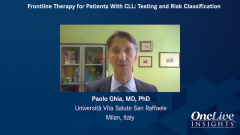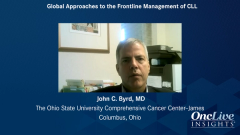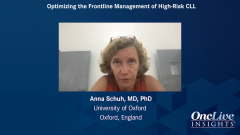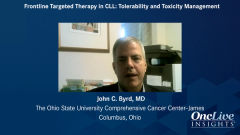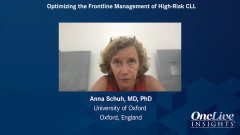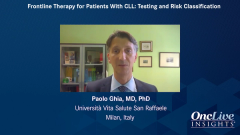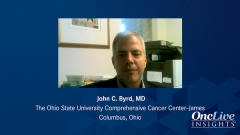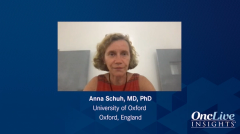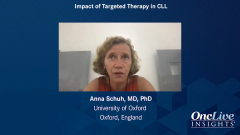
Emerging Strategies in the Management of Relapsed/Refractory CLL
Considerations for the future treatment landscape of relapsed/refractory CLL, in light of emerging practices and clinical trial data.
Episodes in this series

John C. Byrd, MD: We’re at a really exciting point for CLL [chronic lymphocytic leukemia] in which we have a phenomenal target for most patients, Bruton tyrosine kinase [BTK]. We know from mouse models that CLL doesn’t develop when you take out this target either pharmacologically or genetically. Now we have the drug tools to put complete pressure on BTK. We have the irreversible inhibitors, we have the reversible inhibitors, and we have degraders of this target also coming. Why is that important? Because BTK is an important target, and we can target BTK in multiple ways. This is an important target, so we might be able to prevent resistance from developing. It’s counterintuitive not to do combination therapy with different mechanisms, but when you have a target such as BTK, and the cancer cell can’t survive without it in most cases, this dual targeting is an exciting approach that our group and others are interested in. Coming down the pike, there are very exciting data with therapeutics that target other antigens on CLL cells, such as the bad receptor A736, where giving this antibody rather than obinutuzumab in CLL with some of these targeted therapies is going to be exciting. That’s another approach that I’m excited about. There are a lot of exciting things in the area of CLL moving forward that hopefully are going to make things even better for our patients.
Anna Schuh, MD, PhD: There definitely are new agents coming along, and the noncovalent-bound BTK [Bruton tyrosine and inhibitor], the third-generation BTK inhibitors, are very promising. The data are early phase data for the time being. I’m sure the development of these drugs will go into the frontline setting. Will they replace ibrutinib and acalabrutinib at some point? It might well be. It’s too early to say. We must have head-to-head comparisons. They seem to work irrespective of the mutation status in the kinase domain. The companies will opt for a large market, and the frontline market is what they should be aiming for. But they need the head-to-head comparison for that.
At the end of the day, the decision on which a BTK inhibitor will be given is not going to be about efficacy because none of them cures. It will be about tolerability. With acalabrutinib we have a very well-tolerated BTK inhibitor. It would be tough to show even better tolerability with a compound in a head-to-head comparison in the front line. Of course, these studies will go on forever, and that’s the other problem. If you don’t get MRD [minimal residual response] negativity with a BTK inhibitor, then you need to have a good primary end point. In the frontline setting, these studies will be difficult to run. They’re probably going for relapsed/refractory setting of high-risk individuals, where you get readout quicker and can still assess for tolerability. That would be my feeling: the drug development will be more complicated than the drug development of acalabrutinib, where the frontline study could still go with a comparator. In this setting for the third generation, they’ll have to compare directly against acalabrutinib. My view is that tolerability is key.
The elephant in the room is cost. Even with equal tolerability and relatively equal efficacy, if the drug is cheaper, then that drug will win. The next change would be to aim for cure. None of the BTKI inhibitors on their own can do this. That’s where the combination studies obviously are very interesting.
Transcript Edited for Clarity


